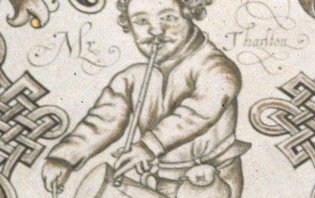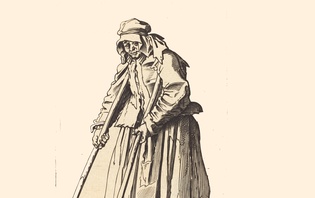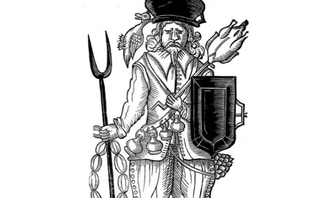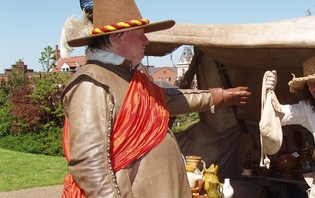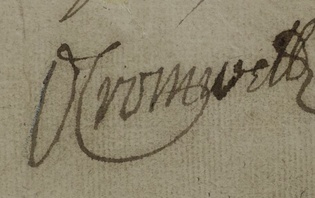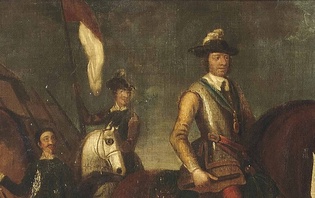Prisoners of war: the lowest priority
The plight and place in diplomatic relations of prisoners of war during the Civil Wars was discussed in a previous blog but how did the situation differ for the prisoners of war originating from foreign powers? During the Interregnum and Restoration periods at the heart of the chronological era under study by Civil War Petitions, Britain fought three wars against the Dutch Republic. These resulted in the capture of numerous sailors by both sides, who were then held as prisoners of war. We are delighted to welcome Gijs Rommelse, who in this guest blog reveals the concerns raised about the welfare of Dutch sailors incarcerated in England and the discrepancy between theory and reality in the treatment of foreign prisoners of war in England.
In 1656, Arnoldus Montanus, a preacher of the Dutch Reformed Church, published in Amsterdam a pamphlet entitled The troubled ocean, or the two-year sea exploits of the united Dutch and the English. Montanus, who at Leiden had studied philosophy and theology, wrote copiously on these and also historical and geographical subjects, and was a fanatical supporter of the House of Orange. In his account of the First Anglo-Dutch War (1652-1654), he wrote of Dutch prisoners of war, who in 1653 were incarcerated in Ipswich and Chelsea, and the appalling treatment to which they were subjected. ‘Those that death spared resembled skeletons rather than men … Some, from deprivation, lost their reason. In Chelsea they lay, under the open sky, within a walled enclosure with guards set round it. Those who, from despair, chose by escaping to risk an uncertain death, rather than a worse captivity, were often recaptured, shot, put to the sword, or at least to the torture.’
Montanus showed himself deeply troubled at the treatment received by the Dutch seamen in England, although his purple prose may also have served to increase the evocative power of his pamphlet. The question naturally arises as to the veracity of his account. He was certainly not the only Dutch writer to describe the captivity of prisoners of war in England as hellish. In 1667, an author, who preserved his anonymity by employing the initials EVL, published a pamphlet entitled The cautious Hollander. Shown in a dialogue between a politician, a merchant, a sea-captain. All three upright Hollanders. An Englishman, resident in Holland. He proposed that ‘Worse even than sudden death by water, fire, the sword or other deadly weapon is the frightful expiration from hunger, thirst, cold or other privation, to which one would not subject a dog. Nevertheless, in England our Dutch captives have met their deaths by all these cruel means, so that in places every tenth, ninth, eighth, seventh; yea, even every fourth or third man died or, more accurately, was driven to his death. This conduct is in flagrant contravention of the Rights of all Peoples and would not be possible without such violation.’
It is natural to question whether accounts such as the above reflect the bias of Dutch authors who, while they may well have believed in their own narratives, were prepared to pander to the strongly anti-British feelings of their intended reading public. This would be plausible, were it not for the fact that similar reports are to be found in English sources also. Andrew Marvell who, in his Character of Holland of 1672 had certainly shown himself no friend of the Dutch, wrote in 1677 that ‘Sir William Doyley got 7000 £. out of the Dutch prisoners’ allowance, and starved many of them to death.’ If Marvell, whose career was founded largely on biting criticism of others, may not have been the most reliable source, the same could certainly not be said of John Evelyn, the celebrated diarist who, like Doyley, was one the Commissioners for the Sick, Wounded and Prisoners. He wrote many letters to King Charles II and to various Privy Councilors with appeals for funds for the maintenance of the Dutch captives, who were accommodated at various locations. He pleaded the impossibility of the task of housing and feeding them in a humane manner. Their numbers were too great and they arrived, following the great sea battles, in unmanageable waves. So dire was their situation, he wrote, that they were held in the open air, without straw to lie on or sufficient food. Some had already died and others would soon follow if no funds could rapidly be made available. These representations he not only addressed to his superiors but also confided to his diary.
There was, in the seventeenth century, as yet no legal code of practice concerning the treatment of prisoners of war. Usually, after some time had elapsed, the combatants would reach some ad hoc arrangement concerning the exchange of captives. It was not that no legal code of war existed; as noted above, for ‘EVL’ the English authorities were obliged to respect the Rights of all Peoples which, in principle, they observed: the Commonwealth, Protectorate and Restoration regimes had all felt themselves obliged to treat the Dutch prisoners humanely. They were, after all, fellow Christians fulfilling their obligation to serve their sovereign state. The unwritten convention obliged them to clothe, feed, house and care for their captives, who were not to be exposed to violent treatment. They were not to be denied the prospect of future freedom, either through a general exchange or the opportunity to purchase their release. The basis for this semi-official law of war was formed by Christian values and common humanity but also by calculated self-interest. The Dutch cities housed large numbers of English prisoners; reports of ill-treatment of Dutch captives in English hands could result in a cycle of reprisals (see photo above for an example of this).
Since the English authorities apparently acknowledged their obligation under the informal rules of war to ensure that their Dutch captives were humanely treated, at the same time making reciprocal demands on the Republic regarding English captives held there, the question naturally arises why so many Dutch prisoners perished through starvation, disease and exhaustion? The answer lies in the simple fact that the needs of foreign prisoners occupied the lowest position on their captors’ list of priorities. Lack of money made it difficult for the English authorities always to maintain the navy’s ships in operational condition; failure to do so made it necessary to lay up the battle fleet in 1667, thereby making possible the Dutch Raid on the Medway. Since there was regularly insufficient money to pay the country’s own seamen, who were forced to accept promissory notes in the form of ‘tickets’, it is not surprising that for the Dutch prisoners there remained almost nothing for their needs. Since the English state finances proved incapable of meeting the challenges of intensive war making, relief attempts were made by Dutch diplomats, by Evelyn from his own pocket and by other English benefactors, but these could provide no more than a slight amelioration of the prisoners’ condition.
Dr. Gijs Rommelse is an Honorary Visiting Fellow at the University of Leicester’s School of History, Politics and International Relations. He teaches history and social sciences at the Haarlemmermeer Lyceum in Hoofddorp (The Netherlands) and is head of the school’s History Department. Gijs gained his PhD from the University of Leiden with a dissertation titled ‘The Second Anglo-Dutch War (1665–1667)’. His research interests include Anglo-Dutch relations, early modern political and military cultures, privateering, prisoners of war and political economy. He has published widely on these subjects, his most recent work being (together with David Onnekink) The Dutch in the early modern world: A History of a Global Power (Cambridge: Cambridge University Press, 2019).

